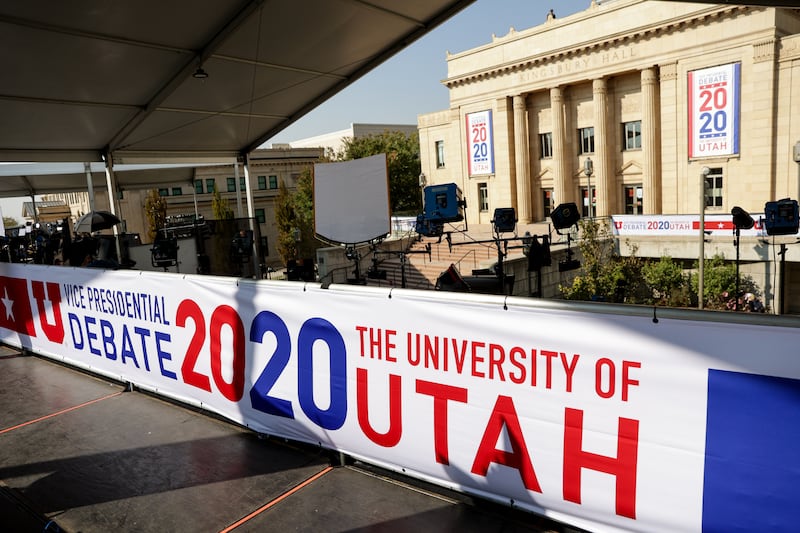Gov. Spencer Cox predicted the 2024 presidential debate in Utah will feature more than just the two major party candidates — but, if it were up to him, the Utah governor said he would prefer the stage be populated with anyone other than the current Republican and Democratic frontrunners.
“I would love to see some new choices,” Cox said. “And by the way, I’m not alone.”
Cox spoke at a press conference Monday afternoon at the University of Utah’s Kingsbury Hall, where the third and final general election presidential debate will take place on Oct. 9, 2024.
The Commission on Presidential Debates announced its decision Monday morning to bring a national debate to Utah for the second election cycle in a row, after the University of Utah hosted the vice presidential debate between Mike Pence and Kamala Harris in 2020.
While Cox and other Utah leaders expressed excitement at the prospect of showcasing Utah’s ability to “Disagree Better” during its moment in the campaign spotlight, the governor said most voters are less than thrilled about the two major party candidates.
Why are Trump and Biden so unpopular?
“Every poll that’s been done over the past year, has shown that Americans of both parties want to see two new candidates as well,” Cox said. “Hopefully by the time we get to October, we have some good choices for Americans.”
However, despite polls showing that most Americans do not want either candidate to run again and are willing to consider a third-party candidate, a Trump-Biden repeat appears as inevitable as ever.
With national polls revealing concerns about Biden’s age and weakness in a potential Trump matchup, Biden now faces a new challenger from within his party — Rep. Dean Phillips of Minnesota — and challengers from without — including Robert F. Kennedy Jr., an independent who might qualify to make the debate stage next year if his polling surge continues.
Likewise, Trump remains unpopular among the general electorate with some of his primary opponents, including former South Carolina Gov. Nikki Haley, doing better than he does against Biden. Trump also faces a potential outside threat from No Labels, a nonprofit which has committed to running a one-time “unity ticket” to challenge Trump should he become the GOP’s nominee.
If Kennedy or a No Labels candidate, were to receive at least 15% in five different polls next year, the 2024 presidential debates could become only the second in U.S. history to include more than two participants — the last time being in 1992 when independent candidate Ross Perot debated Republican incumbent George H. W. Bush and Democratic nominee Bill Clinton.
But regardless of the debate participants, Cox said the presidential debate will be an opportunity for Utah to present a “strict contrast” to the division often displayed by national leaders.
How do Utahns “Disagree Better” than presidential candidates?
“I suspect that that the debates and this next election will be very polarizing, as the last ones have been,” Cox said at Monday’s press conference. “I’m hopeful that Utah will get an opportunity to showcase our ability to do things a little differently.”
This hope was shared by the press conference’s other speakers — University of Utah President Taylor Randall, Hinckley Institute of Politics Director Jason Perry, Utah Senate President J. Stuart Adams, Utah House Majority Leader Jefferson Moss and Salt Lake City Mayor Erin Mendenhall — many of whom referenced Cox’s “Disagree Better” initiative as chair of the National Governors Association.
“As this blue dot in a very red state, to stand here with my friends, even though we disagree on a great many things, we get along, and we work hard,” Mendenhall said. “Utahns will show who we are and what we’re good at, which is welcoming the world.”
Mendenhall, and others, made frequent reference to the Salt Lake City Winter Olympic Games of two decades ago, saying the state has proved its volunteerism, professionalism and organization on many occasions and this is what earned the state the national recognition of hosting a presidential debate.
Will the Republican candidate show up at the debate?
Unlike past elections, there is no guarantee that the Republican presidential nominee will attend the 2024 debates.
In 2022, the Republican National Committee voted unanimously to sever ties with the Commission on Presidential Debates, stating that Republican presidential candidates would no longer participate in the commission’s events because of alleged bias in the way it treated Republican candidates.
When asked about a potential scenario where the Republican presidential nominee refuses to attend the debate, Cox said state leaders were “hopeful” that each qualifying candidate would participate but they did not have any authority to speak for how the Republican National Committee or the the Commission on Presidential Debates will handle the situation.
Next year’s debate is expected to cost at least $6.5 million, similar to the amount spent for 2020’s vice presidential debate, said Perry, whose team was behind the debate application. The needed money will be raised from private donations and potential funds allocated by the state legislature during its next session, according to a University of Utah press release.


